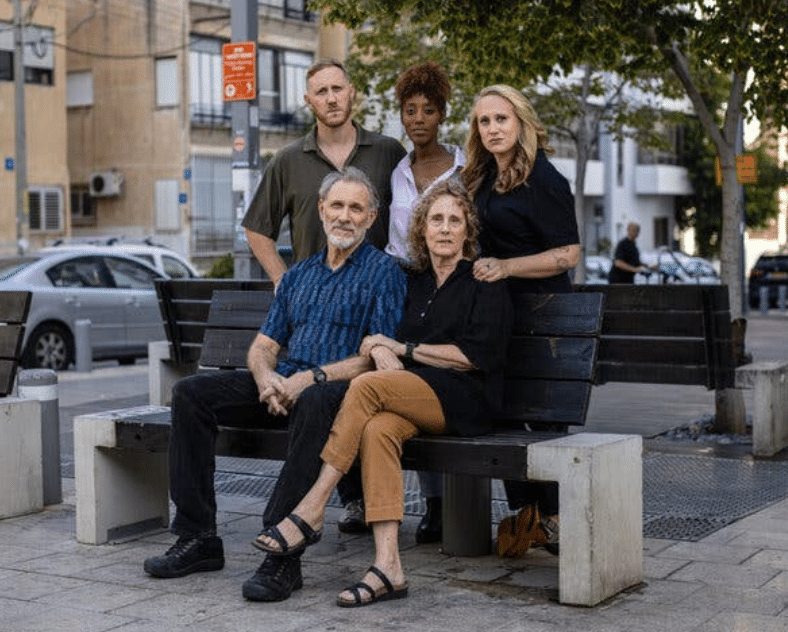Emma Goldberg and Marc Tracy talked to more than two dozen Jewish Americans, including those within the same families, about their views on Israel.
Marc Kornblatt prepared uneasily last month for his daughter, Louisa, to arrive for 10 days with the family. Her homecomings once brought the comfort of movie nights and card games, but this year was different.
Mr. Kornblatt sang under his breath some lyrics from “West Side Story”: “Get cool, boy.” He and his wife discussed: How would they greet their child? Would they acknowledge the emotional distance, the slights that had piled up from afar?
He and his wife, Judith, had moved away from Madison, Wis., to live in Tel Aviv, where they felt a real sense of belonging as Jews. Around the same time, their daughter, attending graduate school at the University of California, Berkeley, came to oppose the existence of Israel as a Jewish state.
[The New York Times Report continues]
For at least a half-century, American Jews — the substantial majority of whom tend to be liberal and vote Democratic — have largely supported the Jewish state across the spectrum of age, partisanship and religious denomination. Recent polling suggests that that is changing.
Even before the war, younger American Jews were generally less attached to Israel than their elders, according to a 2021 Pew Research survey. (Most of the people interviewed for this article did not identify as Orthodox, a small segment of the American Jewish population who tend to have a stronger attachment to Israel than others do.)
A survey that the Democratic pollster GBAO Strategies conducted in November, a few weeks after the start of the war, for the nonpartisan Jewish Electorate Institute, found a striking generation gap in American Jews’ attitudes toward President Biden’s strong support for Israel: Eighty-two percent of those 36 or older supported the president, but only 53 percent of those 18 to 35 felt that way.
Jim Gerstein, who conducted the survey, said that younger American Jews have little or no memory of an underdog Israel surrounded by enemy states or terrorized by suicide bombings. Instead, they grew up when Israel had developed into a thriving economic and regional military power, backed by the United States and largely insulated from its neighbors — a perspective that inclined them to judge Israel more harshly, especially under the conservative leadership of Benjamin Netanyahu.
“Jewish voters are very liberal, and younger Jews even more so, and hold a different perspective of Israel than older generations,” he said.
‘How do I bridge this?’
The parents of Mr. Schwartz, the Columbia student, said they listen to him with open minds when he tells them about documentaries he has seen or things he has learned from professors like Rashid Khalidi, a prominent Palestinian intellectual who is a professor of modern Arab studies at Columbia. Dan Schwartz said his son helped him understand the Palestinian perspective on Israel’s founding, which was accompanied by a huge displacement of population that Palestinians call the Nakba, using the Arabic word for catastrophe.
“It wasn’t until Jackson went to Columbia and took classes that I ever heard the word Nakba,” Dan Schwartz said.
Still, he said he felt that his son’s education downplayed “the fact that Israel is and has been surrounded by terrorists who do want to destroy them.”
Jonathan Taubes, who grew up in a right-leaning modern Orthodox community in New Jersey, understands that his own perception of Israel is starkly different from that of his parents, who remember the Arab-Israeli War of 1967 and the Yom Kippur War of 1973. His mother is the daughter of Holocaust survivors. Recently, she went to visit Mr. Taubes in Brooklyn, and began discussing her fears of anti-Jewish hatred as soon as she walked into his apartment.
Mr. Taubes, 30, felt torn between wanting to comfort his mother and feeling uneasy with her exclusive focus on Jewish pain.
“I was sort of trying to hold both sides — a progressive left one, and a defensive Jewish one,” he explained. “It’s a feeling of discomfort, like, how do I manage this, how do I bridge this?”
“There’s this feeling of being alienated from the world, but then the added layer of strife and division within our own family,” Mr. Taubes added. “It’s an extra layer of pain.”
[The New York Times Report continues]
“I don’t think the state of Israel should ever have been established,” she said. “It’s based on this idea of Jewish supremacy. And I’m not on board with that.”
As Ms. Kornblatt’s political views were shifting, her parents moved in the opposite direction, becoming so attached to Israel that they decided in 2019 to make it their home.
The Kornblatt parents had long felt a unique sense of comfort when spending time in Israel, and realized during a visit to Tel Aviv that they might want to put down roots there. Louisa’s older brother Jake Kornblatt, 35, who is politically aligned with their parents, also made Tel Aviv his permanent home.
“We felt like, for the first time, we weren’t going to be the other,” the elder Mr. Kornblatt said.
What he hadn’t expected, he added, was that moving to Israel would bring on a new kind of isolation. “When I moved to Israel, all of a sudden I was a Jew and colonialist and apartheid lover,” he said, referring partly to comments from American friends and students on social media.
[The New York Times Report continues]
“Has there been racism, has there been a lot of injustice, have there been war crimes potentially? Yes, but there’s more to it than that.”
Jake Kornblatt, with his wife, Tamar Asnko
His sister seems to have “this idea of this insidious plan of Zionists coming in and wanting to subjugate people,” he said. “Has there been racism, has there been a lot of injustice, have there been war crimes, potentially? Yes, but there’s more to it than that.”
He disagrees with her use of the word apartheid to describe Israel. “If you use this type of language, the other side is not going to be able to listen to you,” he said.
Tamar Asnko, 36, an Israeli Jew who is married to Jake, said she doesn’t agree with Louisa on everything, though she found their recent discussions in Tel Aviv interesting.
Ms. Asnko moved to Israel from Ethiopia when she was 4, and Israel is the only place she calls home. “It’s complicated,” she said. “There isn’t black and white here. There’s a middle ground. I feel like people who don’t live here don’t understand the middle ground.”
In the final days of her visit, Louisa Kornblatt felt tension in her parents’ home. She walked into the apartment after volunteering to help Palestinian families harvest olives in the West Bank. She gave her father a hug and noticed that he didn’t hug her back.
Mr. Kornblatt told his daughter that he was hurt that she would use her precious time on a visit with family to volunteer in the West Bank. “Does this have to be the time?” she recalled him asking her, to which she replied: “Yeah, this is the time.”
In the final 45 minutes before departing for the airport, as Ms. Kornblatt was packing, the family had one last noisy argument about what political solutions to the war were possible. Then they walked outside to get her a taxi, and hugged one another.
“I didn’t leave with any doubt that my family loves me,” Ms. Kornblatt said.

